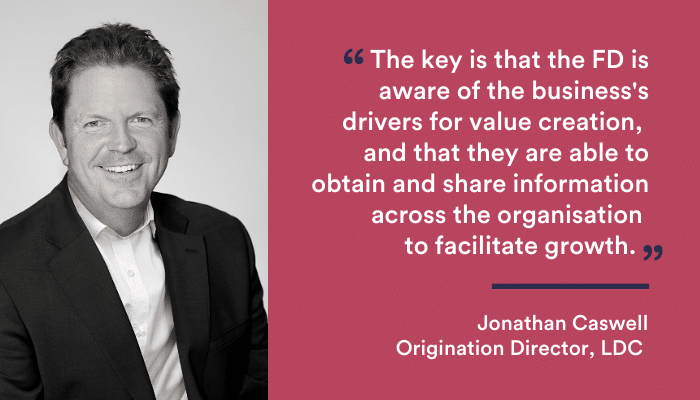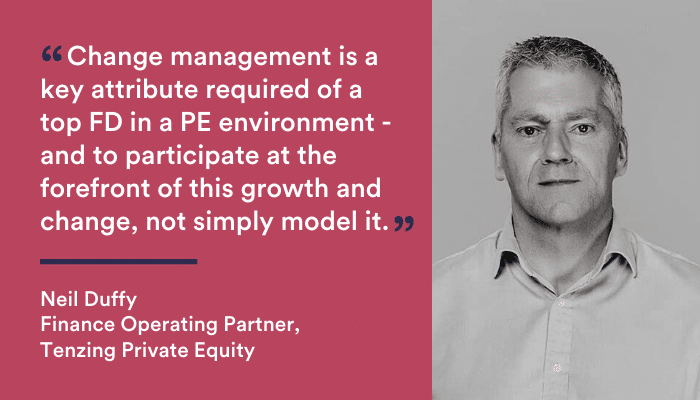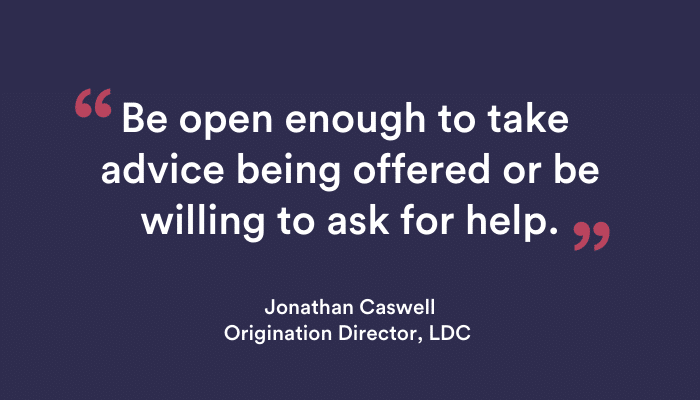What Makes a Top FD: The Private Equity Perspective
In this series of articles, we speak to local business leaders and financial experts to discover the essential qualities and attributes needed to make it as a top Financial Director (FD). For this third instalment we spoke to two business leaders in the investments sector to get the private equity (PE) perspective on what makes a top FD.
Neil Duffy is Finance Operating Partner at Tenzing Private Equity. He previously enjoyed an extensive CFO career, having worked through four Private Equity exits as well as having gained plc experience and turnaround exposure. Tenzing invests in high-growth UK and Northern European SMEs valued between £10m and £200m.
Jonathan Caswell is an Origination Director at LDC where he has worked for 20 years. His role focuses on deal origination and new business opportunities. LDC invests equity capital to support ambitious management teams across privately owned UK headquartered businesses, typically generating annual profits of £1m to £30m.
The attributes of a top FD
The FD or CFO plays an integral role in any management team, but from the perspective of a private equity firm, there are several key must-have attributes of this individual that stand out for investors looking to work with a company.
The key deliverable of a top CFO or FD in a PE environment is to deliver growth and to support the CEO in achieving this. Neil says: “The CEO must be free to lead the business and be externally focused and it is important the CFO ‘has the CEO’s back’.”
This means that the FD must ensure the day to day keeps ticking over and acts as the ‘glue’ within the senior management team. Jonathan agrees and adds: “Exceptional CFOs have the ability to provide bandwidth for the CEO and an added bonus would be that they are ‘deal aware’.”
Having a full overview of the business enables an FD to manage cash flow and work with sales and operations to drive this growth and mitigate risk. Jonathan says: “The technical competence for an FD is a given. The key is that the FD is aware of the business’s drivers for value creation, and that they are able to obtain and share information across the organisation to facilitate growth.”
During this series of articles, the consistent attribute that all of our interviewees have agreed upon has been communication. In order to support the organisation in the ways mentioned above, an FD must be an effective communicator. Neil says: “It’s not enough to be able to interpret the data, the CFO needs to be able to effectively communicate this to the leadership team and various stakeholders within the business, including the PE investor.”
In addition to excellent communication skills, Jonathan feels that equally important is the ability to build positive relations internally and externally, and build confidence with the board and stakeholders. Having the ability to be agile and forward thinking is also essential. Neil concludes: “Change management is another key attribute required of a top FD in a PE environment and to participate at the forefront of this growth and change, not simply model it.”
Investing in an FD
As a key part of the management team, the strength of the FD in a private equity business is vital and this capability will be assessed as an essential part of the due diligence process. Neil says that a PE firm will be happy to pay for a strong management team. Jonathan adds that when it comes to the FD: “Lack of quality financial information and therefore the ability to understand the business is the biggest ‘blocker’ to potential investment.”
So how do potential investors make an assessment on the capabilities of the FD in situ? “The skill-set of the FD required will be determined by the aspirations of the investment – e.g. turnaround, extensive acquisition” says Neil. He continues: “Therefore the suitability of the FD in situ on investment will be assessed on a case-by-case basis with the performance continually reviewed.”
For Jonathan, with a current portfolio of 90 business, LDC tends to utilise tried and tested FDs within the portfolio to provide mentoring support to any new investment and the respective FD. In addition, they run a series of networking sessions where best practice and ideas are shared in a collaborative forum.
Like LDC, Tenzing also provides coaching. Neil’s role as Finance Operating Partner is to work closely with the portfolio CFOs to expedite the transition to PE CFO, ensuring the ‘framework for growth’ is embedded. This centres on the business plan; ensuring the value drivers are identified, growth assumptions are granular and appropriate KPIs are implemented to track progress. This role is a recent addition to Tenzing’s Growth Team support which also includes an Entrepreneurs Panel, Sherpa programme and access to experienced subject specialists.
COVID-19 and the FD
Many sectors and businesses have been impacted by the pandemic, and while they may have reacted differently, COVID-19 has underlined for all businesses the importance of cash.
Neil says: “In those early Lockdown One days, everyone was preoccupied with the cash position of their business – but the strong, proactive FDs appreciated the importance to act early; for example, to draw down on their overdraft facility to maximise cash capacity and thereafter manage cash proactively.”
For Jonathan, the better FDs in the portfolio were able to demonstrate resilience and rigour. He says: “There was more frequent communication, regular forecasting/reforecasting including regular cash flow updates and contingency planning.”
In addition, these FDs were proactive: “They were quick to respond, agile and adaptable; pivoting the business model if required” says Jonathan.
Private equity vs privately owned business or large corporate
When a business is run under private equity there are understandably different requirements of the management team to that of a privately-owned business or large corporation. The skill set required of an FD is determined by the strategic objectives of the shareholders and the business cycle the company is in.
A commercial mind-set is essential, as Jonathan explains: “Under a PE investor there is the focus to deliver growth and value creation; alignment of the board is essential and this is often achieved with equity, which results in an ownership-based mentality from each of the management team, including the FD.”
This commercial mind-set requires the FD to focus on growth. Neil says: “The main mind-set difference within a PE environment is the extent of the focus on growth and the need to understand that if a business is not growing, in a PE world the business is going backwards as debt still needs to be serviced.”
FDs in the PE environment need to be prepared for a frenetic and more demanding role, than that of a privately-owned business Jonathan says, as the reporting demands are increased, as is the rigour required.
The future for FDs
Looking ahead to the next five years for business, both Neil and Jonathan agree that technology and a greater appreciation for agile working will play a key role in evolving the role of FDs, with a focus on the utilisation of technology to be even more effective.
An example of this, Neil says, will be “Greater use of new analytical tools to access and present better data to enable business decisions – e.g. customer buying patterns, longevity of relationships.”
This feeds into the sustainability of the business and the necessity for the FD to evaluate the office footprint. Neil explains: “Is it still necessary to be based in key risk areas such as big cities? Where should critical infrastructure be located? Questions like these will result in continuing to change technology platforms to the cloud.”
Agile working is the expectation of millennials and in order to attract and retain the best talent this will be key advises Neil. The challenge will be the ability to build collaborative relationships across the business, Jonathan says: “This will be especially tested within a more agile working environment.”
Advice to aspiring FDs
For FDs or CFOs moving into a private equity environment, there can be pitfalls that are easy to fall into, even for those with previous FD experience: “Not being able to adapt to the new ownership structure or new goals of the business is the biggest risk,” says Jonathan. “It can be a culture shock if the FD is not used to PE.”
Newer FDs in PE can fall into the trap of focusing on the balance sheet rather than cash and growth. Neil says: “Producing a decent set of accounts is a given but it is using this information to identify growth opportunities and to support the business to deliver this that is the role of a top FD or CFO.”
In order to overcome these, Jonathan advises that a new FD needs to be open enough to take advice being offered or be willing to ask for help. Jonathan says: “The support will always be there. If you’re not willing to seek help or take advice, you are highly unlikely to succeed.”
Neil advises aspiring FDs or CFOs to take on a role outside of finance at a relatively early stage of their post-qualified career: “This will give you experience of being in a position where you can’t control all the variables and will teach you to think differently about the business, processes and the role of the finance function.”
Neil concludes: “It will effectively put you in the shoes of your work colleagues and whether this be in logistics, sales or fulfilment this will provide you will ‘real world’ experience and make you a more holistic-thinking CFO.”




